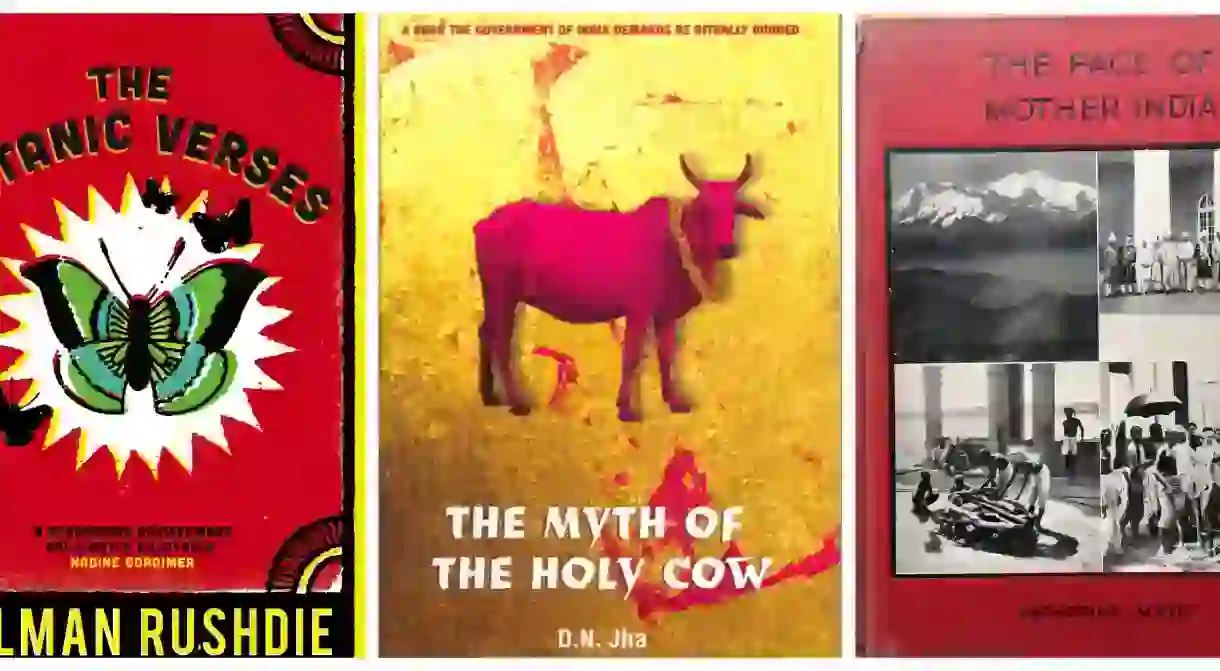Controversial Books That Were Banned in India

Culture Trip takes a look back at eight controversial books that were banned in India for obscenity, insulting religious beliefs and jeopardising national integration.
Rangila Rasul, Pandit Chamupati M.A.
Rangila Rasul was initially published anonymously in 1923, during a period of conflict between Muslims and Arya Samaj (Hindu reformers) in Punjab. The title of this book means ‘Colourful Prophet’ and it describes the marriages and sex life of the Prophet Muhammad, which many Muslims found to be highly offensive. However, the book was defended as supposedly being a retaliatory action to a pamphlet depicting the Hindu goddess Sita as a prostitute. The publisher, Mahashay Rajpal, initially refused to reveal the name of the author and for that, he was imprisoned and later assassinated. The book is still banned in India, Pakistan and Bangladesh.
The Myth of the Holy Cow, Dwijendra Narayan Jha
Cultural historian Dwijendra Narayan Jha quite literally took the bull by the horns when he published The Myth of the Holy Cow in 2001. India’s Hindu majority believes the cow to be sacred and abstains from eating beef. Because of this, the slaughter of cows is illegal in many states in India. But Jha unearthed irrefutable textual evidence in Vedic scriptures and medical texts that showed Hindus believed eating beef and slaughtering cows wasn’t taboo until the 19th century. When he published his findings, the book was promptly banned by the Hyderabad Civil Court and the author received several death threats.

The Land of the Lingam, Arthur Miles
In 1937, Arthur Miles published a book to help Westerners understand Hinduism. He evoked it as a series of impenetrable superstitions and stated that the worship of the lingam (phallus) was an important aspect of Hinduism, suggesting that ‘sex is the keynote of the Indian’s life’. He also wrote that India’s caste system – a hierarchical class structure determined upon birth – was brought into being solely so Hindu priests could dominate society. The book offended many people in India and was subsequently banned for its obscene content.
The Satanic Verses, Salman Rushdie
Salman Rushdie’s 1988 novel, based on the life of the Prophet Muhammad, attracted worldwide controversy. Islam believes there is only one God, but Rushdie’s novel is a fictional retelling of several verses that initially appeared in the Qur’an (before being removed), in which the Prophet Muhammad mentions three pagan Goddesses, whom he describes as God’s intermediaries. Rushdie’s novel goes on to describe Islam as a religion with too many rules and paints unflattering portraits of important figures in the Qur’an. Many Muslims considered it highly blasphemous and the Indian Finance Ministry banned its importation into India only nine days after its publication. By early 1989, Ayatollah Ruhollah Khomeini, then Supreme Leader of Iran, issued a fatwa calling for Rushdie’s death, forcing him into hiding for several years. The ban is still in place and Rushdie was pressured into cancelling an appearance at the Jaipur Literature Festival in 2012.

Dwikhandita, Taslima Nasreen
Taslima Nasreen is a controversial Bangladeshi feminist known for speaking out against the oppression of women in Muslim culture. Consequently, a fatwa was issued against her in 1994. A decade later, she released Dwikhandita, an autobiography in which a short section of the book recalls Bangladesh in the 1980s when the military threw out secularism in the country. This upset many members of the Muslim community, causing protests that had to be broken up by the army. As a result, Dwikhandita was banned in West Bengal and Nasreen had to be placed in safe custody and was forced to leave India in 2008.
The Hindus: An Alternative History, Wendy Doniger
In 2009, Sanskrit scholar Wendy Doniger published an alternative history of Hinduism, drawing upon perspectives of women, animals, outcasts and Dalits to contradict the sanitised, patriarchal views of Hinduism. The Dalits, who make up almost 17% of India’s population, are part of the lowest caste and have long suffered the stigma of ‘untouchability’ due to their menial professions. On the other hand, outcastes were historically those who belonged to no caste, perhaps as a result of inter-caste marriage. Hearing about these marginalised voices outraged some of India’s Hindu population and the book was consequently banned for ‘deliberate and malicious acts intended to outrage the feelings of any religious community’. It has since returned to the market.

The Face of Mother India, Katherine Mayo
In 1926, an American researcher published a book based on her travels in India, railing against harmful traditions sanctioned by Hinduism, such as child marriage and the treatment of women and Dalits. In describing these traditions, the book was used as evidence to support the fact that India would be better off under the ‘civilised’ British colonial rule. In India, the book was burned in protest and Gandhi referred to it as ‘the report of a drain inspector sent out with the one purpose of opening and examining the drains of the country to be reported upon’. It is still illegal to import the novel into India.
Great Soul: Mahatma Gandhi and His Struggle with India, Joseph Lelyveld
In 2011, Pulitzer Prize-winning journalist Joseph Lelyveld published a biography of Gandhi. In the book, he suggests that Gandhi had an intimate relationship with a German-Jewish architect, Hermann Kallenbach, whom he lived with in Johannesburg for two years. Many believe Lelyveld was insinuating this was a homosexual relationship and the book was promptly banned by the government in Gujarat. Prime Minister Narendra Modi said the writing was ‘perverse in nature and hurt the sentiments of those with capacity for sane and logical thinking’ and demanded a public apology from the author.














